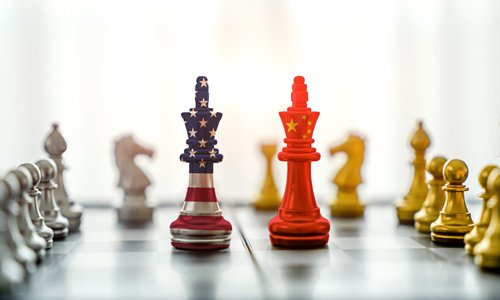HOME >> OPINION
China, US cooperation key to battling coronavirus, restarting global economy
By Robert A. Manning Source:Global Times Published: 2020/4/5 10:08:40

China US
For 70 years, the US as the leading military power, top economy, and technological power, a market of first resort, and security guarantor was viewed as a world leader. When there was a global crisis, the world often looked to Washington.Long before the coronavirus, however, policy failures like those of the 2003 invasion of Iraq and the 2008 financial crisis began to erode US stature and credibility. The American trait of recovery from crises makes it a mistake to underestimate US resilience. But the combination of Trump plus the COVID-19 is testing that attribute.
Yet global health was in a separate humanitarian basket, separate from the up and down cycles of US foreign policy and outside strategic competition. It is an issue to which the US has responded boldly. Under both Bush and Obama, the US has led global coalition efforts - including China - against HIV/AIDS, H1NI, MERS, Ebola and SARS. This is the opposite of the Trump administration's inward-looking "America First" approach, eschewing US mobilization of a coordinated international response.
Now, as the US is No.1 with over 200,000 cases of the COVID-19, the chaotic response of the Trump administration has tarnished the image of American competence and of leading by example. Asian COVID-19 responses, aided by their experience during the SARS crisis, stand in sharp contrast to US efforts. The key to containing the virus is to trace contacts, quickly test, then quarantine, and do social distancing. This has been the formula for nations that have best minimized the impact of COVID-19.
In the first weeks, the US downplayed the seriousness of the threat, as some other nations initially did. In the US case, lack of preparedness has been striking. There is still a chronic shortage of testkits into March, with the result more uncertainty of the extent of the virus. In recent weeks, the US has ramped up production of testkits, with more than 500,000 tested, but it is still difficult for many Americans to get tested sufficiently to get a full picture of the severity of infection. Despite belated massive efforts to produce or import masks, protective equipment and ventilators there also remain substantial shortages.
Explaining how a wealthy, technically advanced nation, leader in innovation and scientific research has struggled in response to a pandemic reveals much about America's political trajectory and changing role in the world.
For many years, well before Trump, Republican politicians and the right-wing media echo chamber have been anti-government, anti-science, vilifying the federal government, cutting budgets for social services, and disparaging civil servants. The cumulative impact has been a mind-set of distrust and skepticism about government and a tribalized politics.
Trump has intensified that, attacking US institutions: law enforcement, the intelligence community, the Congress, and the media. This has led dozens of experienced foreign and civil servants and more than 1,000 scientists to resign, leaving dozens of government positions vacant.
This helps explain the rise of populist nationalism and political polarization resulting in a largely dysfunctional political system. Trump's "America First" has projected this mentality internationally, showing disdain and disregard for US allies and global institutions like the WTO. Europeans, for example, were not consulted or warned before Trump banned all travel from the EU. The continuing downward spiral of US-China relations is also a reflection of this trend.
The blame game is poisoning public opinion in both nations and false conspiracy theories have heightened tensions. There is plenty of blame to go around. But US insistence on using the term "Wuhan virus" has blocked statements at the recent G7, the virtual G20, and at the UN Security Council. Limiting much needed active, global cooperation in a crisis for domestic political motives defies reason.
Whether the US and China can now pivot toward collaboration where interests overlap will shape the degree of global cooperation with regard to both more effectively combating the coronavirus and no less, in the huge challenge of restarting the global economy. US -China cooperation in 2008 was a significant important factor in recovering from the financial meltdown.
Crises like pandemics often change societies and civilizations. That a deeply divided US Congress reached consensus on a $2 trillion spending package to limit economic damage may be a sign of unity - or just a temporary reprieve.
US agencies now airlifting medical supplies from China and Trump's recent positive comments about China also signal at least a truce, and may lead to a change in US perceptions. While the US views China warily as a strategic competitor, the policy has yet to define the bounds or terms of competition, and where interests overlap to allow cooperation.
The current global health and economic crisis is a good opportunity to fill out this incomplete policy. Issues like infectious disease, climate change, anti-narcotics and biodiversity have long been an area of US-China cooperation. If rationality prevails, they may again. With enormous stakes for both nations in the quest for recovery, the old truism comes to mind: Necessity is the mother of invention.
The author is a senior fellow of the Brent Scowcroft Center for Strategy and Security at the Atlantic Council and its Strategic Foresight Initiative. Follow him on Twitter @RManning4. opinion@globaltimes.com.cn
Posted in: VIEWPOINT